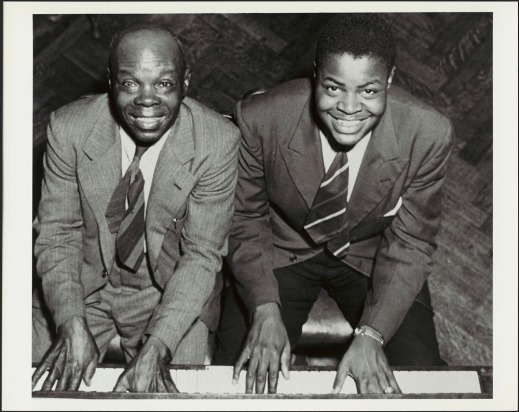
Oscar Peterson and his father, Daniel, at the piano [1944]
When every heart joins every heart and together yearns for liberty,
That's when we'll be free.
When every hand joins every hand and together molds our destiny,
That's when we'll be free.
Any hour any day, the time soon will come when men will live in dignity,
That's when we'll be free, we will be
When every man joins in our song and together singing harmony,
That's when we'll be free.
That's when we'll be free.
When every hand joins every hand and together molds our destiny,
That's when we'll be free.
Any hour any day, the time soon will come when men will live in dignity,
That's when we'll be free, we will be
When every man joins in our song and together singing harmony,
That's when we'll be free.
Hymn to Freedom -- Oscar Peterson
Oscar and his four siblings grew up in a poor neighbourhood in Montreal. All were accomplished musicians, in no small part because their father, Daniel, was a disciplinarian in their development. Daniel, an immigrant, played both organ and piano. I haven't been able to find much about the part that faith played in the Peterson household but it would have been difficult to be an organist without a church home in the early part of the twentieth century and the whole family would play concerts in churches.

Daniel did what many Black men did in that era, working as a porter on the Canadian Pacific Railway for meagre pay. I was aware of this but not that it was common to call all porters "George" until reading an article in the Toronto Star by Jennifer Yang
During the golden age of North American train travel, sleeping cars often came with porters who would carry your luggage and shine your shoes. Porters were smiling, courteous and unfailingly polite; for the better part of the last century, they were also Black, male, and sometimes referred to condescendingly as “George’s boys” — or, simply, “George.”
Both terms refer to George Pullman, a 19th-century American industrialist who pioneered and popularized a brand of train service modelled after the type of Black servitude found in Antebellum-era plantation houses. The first Pullman porters were ex-slaves and in Canada — where post-Confederation railway companies imported and replicated the Pullman model — Black porters worked for decades under discriminatory conditions for minimum pay.
“Most of them hated that name because it meant they had no individuality,” says Cecil Foster, author of the new book They Call Me George: The Untold Story of Black Train Porters and the Birth of Modern Canada...“You had no identity. You were just a George.”
As we enter into Black History Month its important to realize that discrimination and racism existed (and still exists) in Canada. What is remarkable is the determination, strength of character, and faith of so many to overcome the obstacles to lead exceptional lives.
https://www.thestar.com/news/gta/2019/02/01/the-madness-of-being-george-how-black-train-porters-demeaned-overworked-and-called-by-the-same-name-helped-transform-canada.html
/arc-anglerfish-tgam-prod-tgam.s3.amazonaws.com/public/7HWRM3X2TJGEBEDEAJ7Q4P2H5Q.JPG)
No comments:
Post a Comment